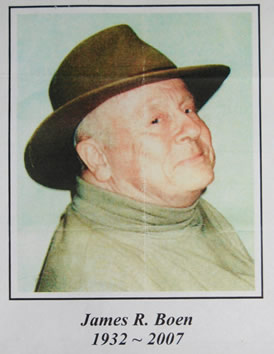The Upbeat Story of Classmate Dr. Jim Boen, Dartmouth '53
 Alumnus James Boen ‘53, one of the oldest living quadriplegics in the United States, died on Dec. 6 at age 75. James, better known as Jim by family and friends, resided in Hopkins, Minn. with his wife of 50 years, Dorothy Boen. “There aren’t many people that could just face reality, accept the situation and do as well as he did,” said Richard Confair ‘53, James’ roommate at Dartmouth. “He’s an inspiration.”
Alumnus James Boen ‘53, one of the oldest living quadriplegics in the United States, died on Dec. 6 at age 75. James, better known as Jim by family and friends, resided in Hopkins, Minn. with his wife of 50 years, Dorothy Boen. “There aren’t many people that could just face reality, accept the situation and do as well as he did,” said Richard Confair ‘53, James’ roommate at Dartmouth. “He’s an inspiration.”
James, an avid gymnast, became paralyzed from the neck down during his junior year at Dartmouth when he fell off of the high bars and landed beyond the safety mats, causing him to break his neck. At first, the likelihood of James’ survival seemed slim and surgeons told him that 60 percent of his chance for recovery would depend upon James himself. James, however, survived the fall and remained in Dick’s House for just under three months. He became well-known by nurses and patients for his sense of humor and optimistic attitude and was frequently visited by friends and College President John Sloan Dickey, who read James excerpts from “Moby Dick.” At Dick’s House, James was “everybody else’s motivator,” Confair said.
When James left Dick’s House to return to his home in Appleton, Wis., he left a note on his bed frame for the next patient. Norman Carpenter ‘53 was in Dick’s House with appendicitis at the time of James’ departure and saw the message. It stated, “Don’t let anything discourage you, because once defeat is admitted, it becomes inevitable.”
While in Appleton, James took courses at a local college to earn enough credits to graduate from Dartmouth, and in 1956, the College granted him a degree in absentia with high distinction in math and a minor in physics. During his time at home, James also worked on regaining his independence. Confair remembers visiting James in Appleton and watching him spend four hours unfastening one buckle on his leg braces. Despite the tedious procedure, James rejected any help from his mother.
As James aged, he refused to let quadriplegia hinder his lifestyle and instead worked to improve the lives and treatment of people in wheelchairs. Instead of hoping for a miraculous cure for his condition, James actively worked against the attitude that the physically disabled are “deaf and dumb” and strongly supported alterations to public buildings such as handicapped entrances and bathroom stalls, Carpenter said. “He thought that he was so privileged to be white and have money and good health and so he didn’t feel like he was a victim,” Dorothy said lightheartedly. The couple met while James studied for his doctorate at the University of Illinois. Dorothy worked at the cafeteria in the men’s dorm and would occasionally carry James’ tray for him.
“He was very persistent,” Dorothy said. “When Jim decided to do something, he didn’t waste time. He decided I was the one for him.” After disputes with adoption agencies over James’ potential life expectancy and capability to be a father, the couple adopted their son, Dean, in 1963 and daughter, Susan, in 1966.
James’ paralysis did not stop him from remaining active. According to Dorothy, he remained so devoted to exercise that friends joked that their wedding vows should include the phrase “for better or for worse, with exercise or not at all.” Because of his strength and talent at the shot put event, James was moved to the status of a paraplegic on his wheelchair track team.
After receiving hand surgery while studying biostatistics at Stanford University, James discovered that he could hold and fire a gun, which inspired him to begin his career as a hunter. James traveled as far as Ontario, Canada and South Africa on hunting trips with friends and captured over 50 animals. His display of the animals in his basement was reminiscent of a “Hemingway white hunter,” Carpenter said.
In 1964, James began to work as a fellow at the University of Minnesota School of Public Health as a professor of biostatistics. By the time of his retirement in 2000, he had served as a full professor and associate dean for academic affairs. At the school, James organized the Rolling Gophers wheelchair basketball team, modeled after a group that he had seen play at the University of Illinois. He became popular for his sense of humor and close relationships with students. According to Dorothy, one of his pupils was married in their living room.
The group of colleagues who ate lunch with James everyday knew him as the “quad father,” which was a perfect nickname for him, Carpenter said. “He was amusing, upbeat,” Carpenter said. “You just can’t believe that a guy with that kind of limitations would have the spirit that he did.”
During his career at the school, James published two books and over eighty papers. His 1982 book, “The Human Side of Statistical Consulting,” made statistics more accessible to the general population. In addition to his wife and children, James is survived by two grandsons. A memorial service was held for James on Dec. 17 in Edina, Minn.
“My life has been very good, with lots of fun and adventure,” James wrote in his book Fifty Years of Quadriplegia. “Quadriplegia hasn’t ruined my life. It just changed it.”